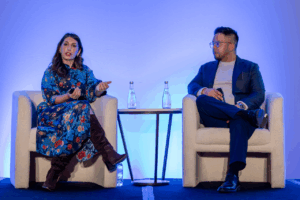The ad industry needs to check itself before it wrecks itself.
That was the rallying cry Tuesday at NBCUniversal’s swanky State of the Industry Forum, where 150 digital and broadcast advertising luminaries gathered in midtown Manhattan for fancy eggs and frank discussion.
“I’ll cut right to the chase: We have a problem,” said Linda Yaccarino, NBCUniversal’s chairman of advertising, upon greeting guests. “We hear it on panels, in papers, over drinks with our agency partners and from our consumers.”
Consumers view many ads as either intrusive or irrelevant. The same ads might be nonviewable or hard for advertisers to measure because of a lack of comparable cross-platform metrics.
“I don’t think all of us in this room put the consumer first,” Yaccarino added. “We have an obligation to make it easy for marketers to measure and to give consumers what they want and the content and information they need.”
Yaccarino implored attendees – who ranged from the CMOs of IBM, L’Oreal and GE to the ad sales chiefs of Turner, Fox, ESPN and Viacom, and Facebook and Twitter’s top brass – to consider whether the ad industry’s current model is sustainable.
Could current ad models fail to exist if the industry sits idle and complacent as consumers choose subscriptions or tune out brand messaging altogether?
NBC Entertainment Chairman Bob Greenblatt echoed the warning.
“Consumers are running away from advertising in droves,” Greenblatt said. “That’s the issue of the moment. We need to get to a point where people watch ads for a reason, and there is much less interruption.”

David Sable, global CEO of Y&R, peppered Google’s Tara Walpert Levy and AT&T Advertising’s new chief, ex-Xaxis boss Brian Lesser, about how premium content and programmatic can coexist. Advertisers, such as Andres Siefken of MasterCard, say they’re relying less often on programmatic because they don’t know where their ads will show up.
Lesser retorted that one of the benefits of increased data and automation is that advertisers can cross-reference Google’s and Facebook’s data sets with their own first-party record – rather than relying only on walled-garden metrics.
Yet, in the pursuit of measurability and reach of these digital ad environments, quality is being sacrificed, Lesser claimed.
“I would argue people aren’t buying YouTube for high-quality content,” he said, undeterred by the fact that he sat next to Google’s Walpert Levy during a panel discussion. “I’m not saying people don’t watch YouTube. … But I’ve never talked to a brand CMO who wanted to spend more on YouTube for its content. They do it for reach and because it’s measurable.”
Consistency in measurement – or the current lack thereof between digital and TV environments, as Facebook’s Carolyn Everson noted – colored the rest of the discussion as marketers like McDonald’s Bob Rupczynski emphasized the need for better measurement around ROI, not just media proxies.
“There are occasions where we’re willing to pay more for a message targeted to a consumer’s needs,” Rupczynski said. “We will never walk away from building the McDonald’s brand, but the more targeted and efficient we can get, the more we can drive an outcome for a specific subset of a segment.”
Opinions were mixed about the viability of “outcomes” as a performance metric for media.
Joe Marchese, Fox Networks’ president of advertising revenue, said he believes media is a function of time and attention and that you “can’t buy outcomes.”
Facebook’s Everson argued that regardless of whether a consumer tunes into an ad for two, 10 or 15 seconds, what matters is meeting the objective of the marketer and the consumer’s expectation for that ad experience.
“Don’t think for one second you can have one standard across every consumer experience,” Everson said. “Collectively, if we put Nielsen, IAS, comScore and Moat together, we’d have some comparability, but the feed versus television versus [platforms] are very different environments.”
NBC’s Yaccarino called on each attendee to write down, even anonymously, what their respective company would do to advance the ad ecosystem and improve the consumer experience. It’s unclear how those proposals will be used.
“NBC is committing to making television smarter,” Yaccarino said. “That means improving the consumer experience, weaning ourselves off of a single currency metric, becoming more focused on meeting real business objectives. Who knows, [maybe] even reducing [our] commercial load across [the] board.”















